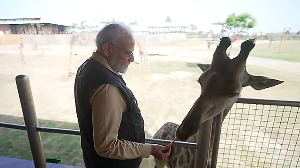While the writings and sayings of American and other Western scholars about our relations with Pakistan get widespread and prominent coverage in our media, we sadly seem to neglect the views of our own scholars on such subjects.
I was saddened when the comments made by Professor Satish Kumar, one of our most distinguished scholars on international relations, recently in New Delhi was largely ignored by our media.
In a brilliantly researched and crafted paper Reassessing Pakistan as a long-term strategic threat, Professor Kumar gave a realistic appraisal, free from any polemics, of the long-term challenge that our western neighbour, dominated and ruled by a rogue military establishment poses not only to us, but to our entire neighborhood.
In his analysis, he dwells on how the army dominates virtually every section of national life in Pakistan, ranging from toppling democratically elected governments to controlling real estate, dominating investments in the stock exchange, producing electrical power, taking over civil service jobs and getting a controlling stake in sectors of industrial production like cement and sugar.
He refers to the growing trends of Islamisation within the army and concludes with an assessment of American scholar Stephen Cohen: 'The present arrangement of a military led or influenced government will prevail indefinitely, but not transform Pakistan. Rebuilding weakened institutions is pointless if the central operating principles of the Pakistani establishment remain hatred and distrust of India and intolerance of diversity at home.'
It is, however, in his analysis of the impact on Islamic extremism that he reveals certain pertinent facts. He draws a parallel between the ideologies of Al Qaeda and Osama bin Laden on the one hand and the ISI-supported Maulana Masood Azhar on the other. He points out that the 'jihadi infrastructure' in Pakistan now includes 40,000 to 50,000 madrassas, with an estimated two million students.
There are today 200,000 armed jihadis in Pakistan, backed by over one million young people, Jihad oriented but not yet armed. A recent poll in Pakistan showed 88 per cent of the people believe the Quran and Sunnah should be the source of all laws in Pakistan. Sixty-four per cent of those polled agree that Pakistan's security interests were served by supporting jihadi outfits in 'Occupied Jammu and Kashmir.'
Kashmir is no longer the cause of Indo-Pak conflict, but a pretext to paper over internal contradictions in Pakistan. While well-informed Pakistanis recognise that regularisation of the Line of Control is the only way to resolve the Kashmir issue, the army needs the Kashmir issue for its survival.
What is it that makes the Pakistan military believe that despite India's vastly superior conventional military and economic strength they can continue to bleed Indian in Kashmir and elsewhere? According to Professor Kumar, the Pakistan establishment believes (not without reason) that from 1987 onwards, India has been deterred from responding militarily to its provocations because of fear of nuclear escalation. Secondly, the Pakistan army is convinced that it has the support of the United States not only in ruling the country, but also in receiving American economic and military assistance, despite the provocations it indulges in against India.
In his conclusion he says: 'Pakistan cannot be blamed for getting away with the impression that it defeated the enemy without fighting a war' following the December 13 attack on our Parliament, as General Pervez Musharraf said on December 13 last year. He asserts: 'There are few examples of a country deploying its troops on a massive scale along the international border for a period of ten months and achieving nothing. Indian public opinion in general and expert opinion in particular has refused to be hoodwinked by the government's claim that the purpose of the deployment was achieved with the successful completion of the elections in Jammu and Kashmir. The so-called coercive diplomacy has wasted its ultimate weapon without any gain. In strategic terms, after full mobilisation hardly any option is left.'
He states that Pakistan poses a long-term security threat to India, which is inherent in the nature of the Pakistani State, its ideology, its power structure, and the imperatives that determine the behavior of its ruling establishment. 'These factors are not likely to change in the next 20 to 30 years. India has to cope with this kind of adversary. Its strategic capabilities and thinking, its national will and character must respond to the situation accordingly.'
A number of questions naturally arise out of Professor Kumar's observations. Is there any justification for Pakistan's belief that its nuclear strategy has deterred and 'defeated' India without firing a single bullet? The manner in which our soldiers were suddenly withdrawn from the borders just after innocent members of their families had been massacred in Kaluchak would certainly encourage such a belief.
Is it true that after a pointless 'full mobilization' last year we hardly have any military option left to deal with Pakistani provocations? Former army chief General Ved Prakash Mallik had asserted that there is substantial 'strategic space' between a low intensity conflict and a nuclear war and that such 'strategic space' could be used by India, to respond militarily to Pakistan's efforts to bleed us in Jammu and Kashmir and elsewhere.
The full-scale mobilisation obviously failed to achieve this objective. Have military planners in India readied options to strike back at Pakistan should there be further escalation in low intensity conflict, or incidents like the attack on our Parliament?
There is very little to be optimistic on this score, given our past record. Further, do we have any long-term vision to deal with a rogue army that undermines democracy at home and promotes jihad abroad?
Given Pakistan's belief (not without justification) that the United States will not really do anything meaningful to embarrass it on cross-border terrorism, should we not be looking at options other than appearing as perennial supplicants before the Americans?
The Bush Administration last year demanded that Pakistan end all cross-border terrorism. President Bush now merely seeks assurances from General Musharraf that terrorism 'does not go up when the snow melts.'
By constantly speaking of the dangers of nuclear conflict, the United States, in effect, reinforces Pakistan's resort to nuclear blackmail. Should not New Delhi point this out to friends in Washington? While we have acted with foresight in Afghanistan, should we not aggressively work to further isolate Pakistan in our neighborhood? Have we developed a strategy to influence public and political opinion within Pakistan about the hazards of their present policies? As Pakistan is going to pose a long-term security challenge, should we not build a national political consensus on how to deal with this challenge that seeks to undermine our secular and pluralistic values?
The issues raised by distinguished academics like Professor Satish Kumar cannot be wished away. While swearing by slogans of Swadeshi and self-reliance we sadly seem to be more influenced by the thoughts of second rate foreign academics, rather than the writings of our own academics like Professor Kumar.
The study of Kautilya's Arthashastra is more important for our students of diplomacy and military-strategic issues than the works of Clausewitz and Metternich. Nations lose their independence, self-confidence and self-respect not by importing foreign technology, goods and services, but by mortgaging their minds to foreign doctrines and concepts.






 © 2025
© 2025